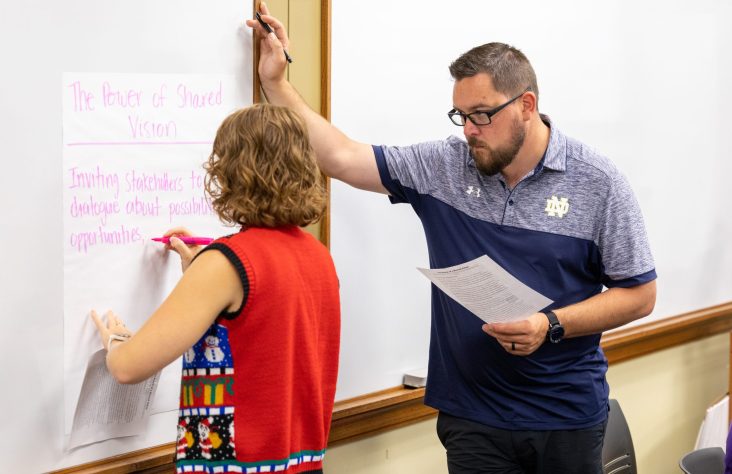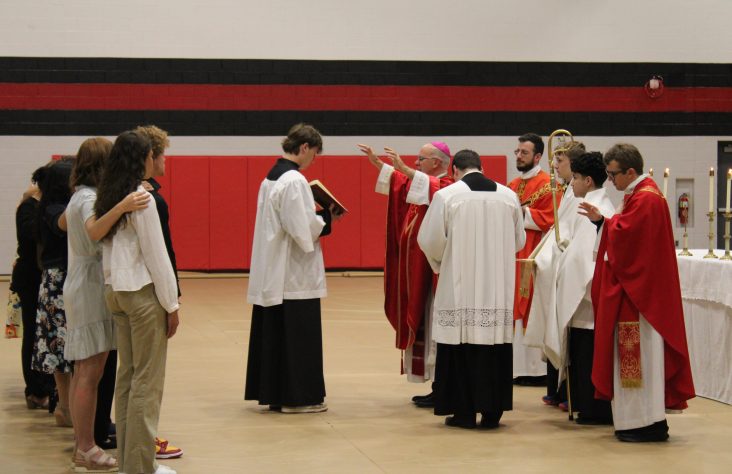February 3, 2023 // Bishop
Lively Panel Holds Out Hope for a True Culture of Life Post-Dobbs
“We can move with confidence into a pro-life future focused on radical equality,” declared Charles Camosy of Creighton University School of Medicine, one of four speakers on a panel discussion titled, “A Culture of Life in Post-Dobbs America”, co-sponsored by the McGrath Institute for Church Life’s Office of Life and Human Dignity, and Notre Dame Right to Life, the largest student pro-life group in the United States.
Invited to wrap up the Jan. 25 conversation held in Geddes Hall at the University of Notre Dame, Bishop Rhoades called it “powerful” and urged everyone to avoid the pitfalls of lethargy and fear in the wake of the Dobbs v. Jackson Women’s Health Organization decision. He said he had come because he is so proud of the students involved in Notre Dame Right to Life, many of whom just returned from the annual March for Life in Washington, D.C.
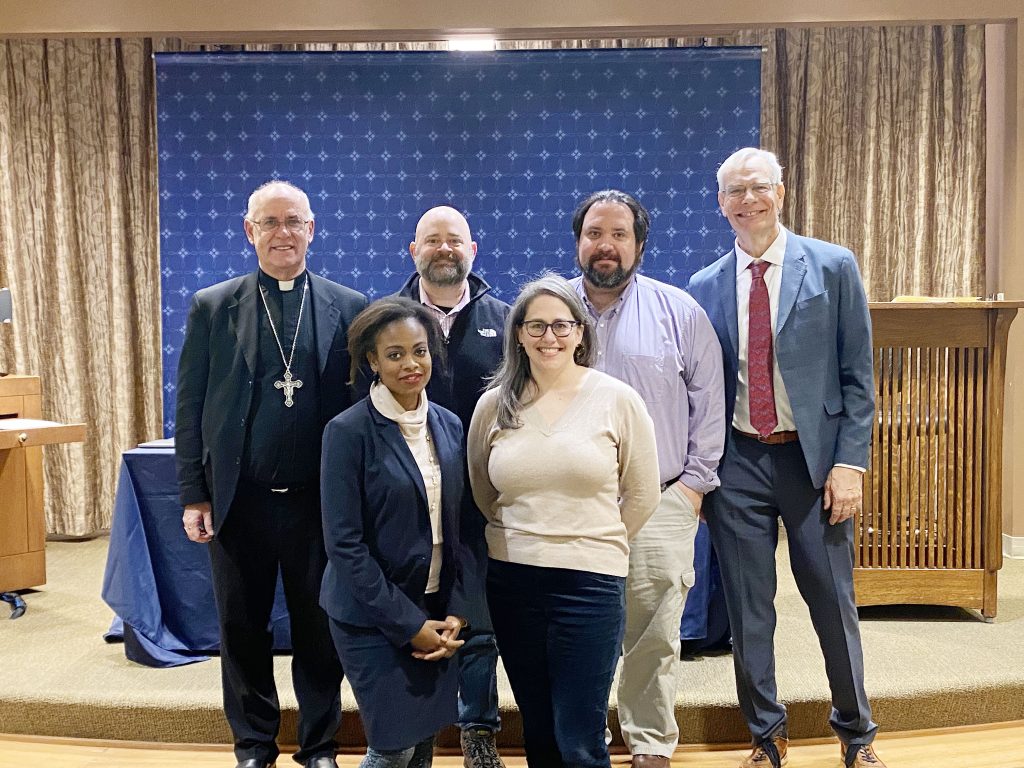
Photos provided by Jill Boughton
Taking part in the panel discussion “A Culture of Life in Post-Dobbs America” on Wednesday, Jan. 25, in Geddes Hall at the University of Notre Dame were (front row from left) Danielle Brown, American Bishops’ Committee Against Racism; and Jessica Keating Floyd, Director of the Office of Life and Human Dignity; and (back row from left) Bishop Rhoades; O. Carter Snead, Director of Notre Dame’s de Nicola Center for Ethics and Culture; Charles Camosy, Creighton University School of Medicine; and John Cavadini, McGrath-Cavadini Director.
The consensus of the panelists was that despite the tidal wave of sensational misinformation about the dangers of Dobbs and violent attacks against churches and pregnancy centers, there is hope. Already abortions in our diocese have been cut in half through the work of pregnancy resource centers like the Women’s Care Center, offering material support and accompaniment to whole families: fathers, mothers, and children born and unborn.
Asked to provide a legal perspective, O. Carter Snead, Director of Notre Dame’s de Nicola Center for Ethics and Culture, first declared that Roe v. Wade had to be overturned before the political branches of government could take any steps toward protecting life. He pointed out that law is grounded in anthropology; you have to understand the nature of human beings before you can promote their flourishing. He argued that persons are not atomized individual wills but embodied and therefore vulnerable and interdependent. The question for lawmakers then becomes how can we take care of everybody? He said that in Texas, they have made a good start by not only outlawing abortion, but also appropriating $100 million to support women in need — not enough, but a proper emphasis.
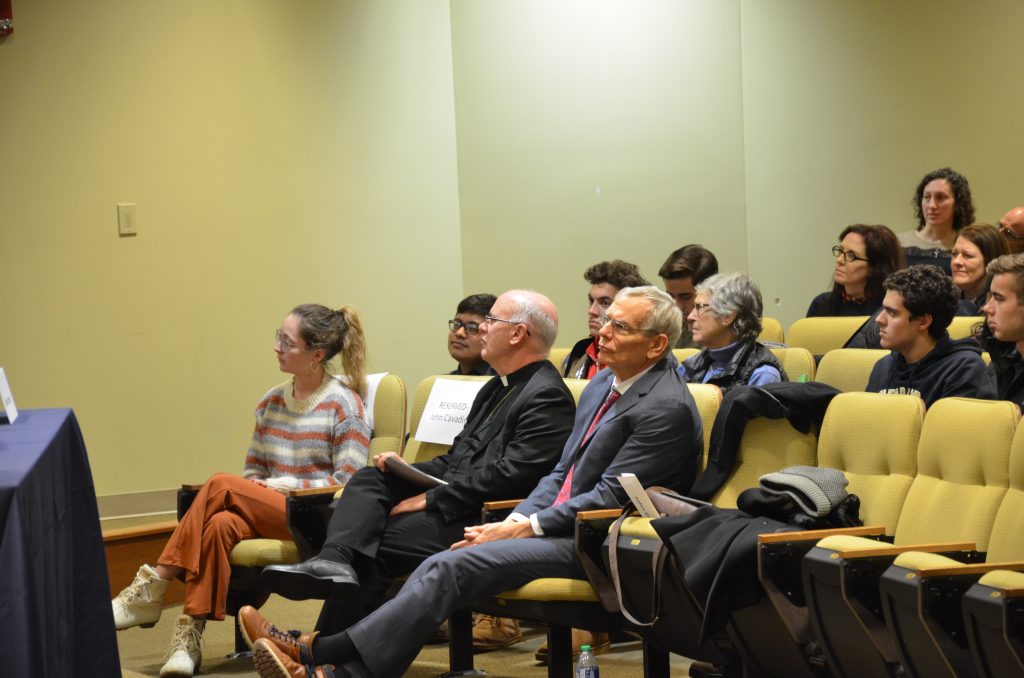
Bishop Rhoades listens attentively to one of the speakers as part of the panel discussion “A Culture of Life in Post-Dobbs America” on Wednesday, Jan. 25, in Geddes Hall at the University of Notre Dame.
Danielle Brown, who serves on the American Bishops’ Committee Against Racism, called herself a practicing Catholic, but not a spokesperson for the entire black community. Moderator Jessica Keating Floyd, Director of the Office of Life and Human Dignity, invited Brown to untangle the way anti-racism has been linked with being pro-abortion, something Brown called a “crown of thorns.” She pointed out that even though people in minority communities are overwhelmingly pro-life, they have such high abortion rates that the number of black people in the United States has remained at 12 percent rather than doubling. She blamed not only eugenics and the location of abortion mills in minority neighborhoods, but the withdrawal of the Catholic Church from urban areas and lack of healthcare, housing, and healthy food. She urged everyone to “read the USCCB’s “Open Wide Our Hearts” in the same way you read Scripture, lectio divina, lingering with what strikes you and probing what upsets you.”
Participating by video, Angela Franks from St. John’s Seminary in Boston analyzed the first waves of feminism and faulted them for what G.K. Chesterton called upside-down values, viewing wage-earning as the only source of happiness, and family life as dispensable. When this misogynistic view tried to fit women into a timetable designed for men, she said, it ran up against what Franks called reproductive asymmetry, the way bearing children impacts a woman. In academia, for example, a woman can’t realistically wait until she earns tenure in her late 30s to think about marrying and starting a family. Franks said it was no wonder feminists like Margaret Sanger found women’s fertility problematic and proposed “fixing” it with technology. This is profoundly unjust to women, she added.
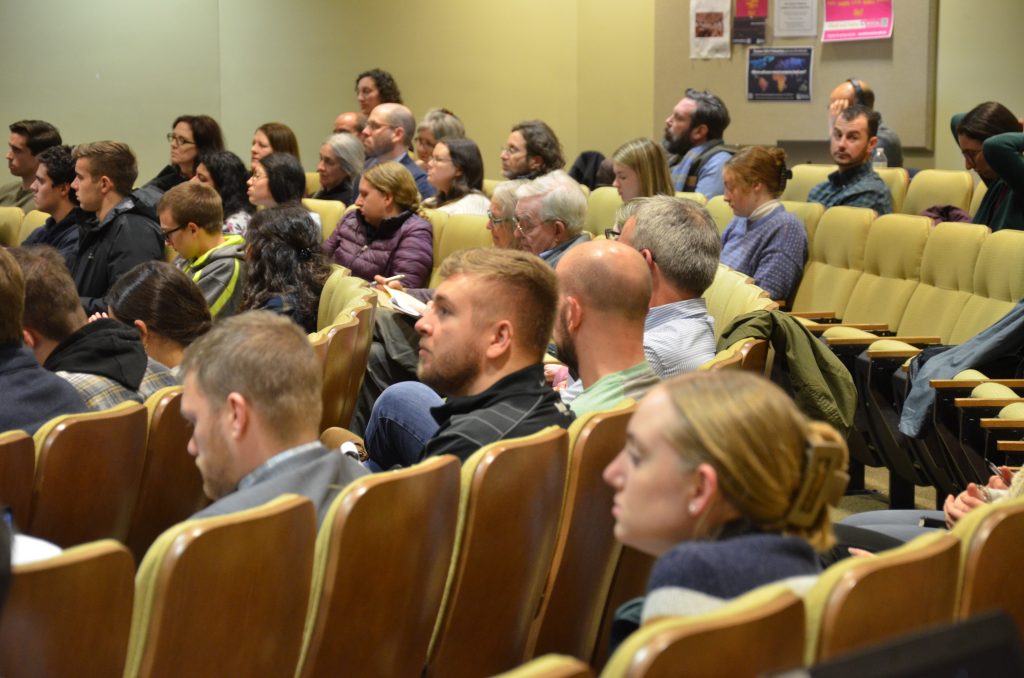
Audience members listen and take notes at the panel discussion “A Culture of Life in Post-Dobbs America” on Wednesday, Jan. 25, in Geddes Hall at the University of Notre Dame.
Camosy claimed that the culture of life is popular among Americans despite the fact that it’s almost impossible to have a civil conversation about abortion across our political divides. He regretted the way the pro-life movement became linked to Reagan economics, minimizing the role of government in favor of private initiatives. “We need an all-of-the-above approach,” he said. Scientific advancements have made it more difficult to deny the humanity of the unborn child. Camosy cited a Washington Post article in which an abortion doula forewarns those ordering abortion pills by mail that what they deliver will look like a baby. There is increasing desperation due to declining fertility. Camosy advocated radical equality rather than competition between mother and child and cited a recent poll in which 90 percent were in favor of laws protecting both women and their unborn children.
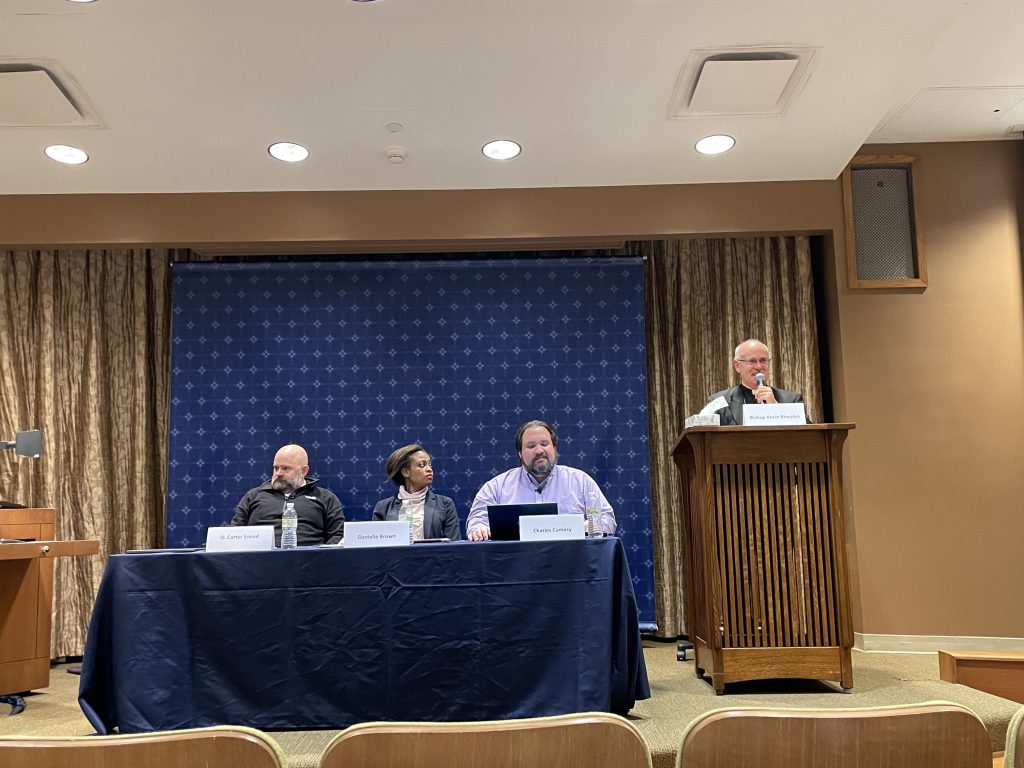
Bishop Rhoades speaks to the audience as part of the panel discussion “A Culture of Life in Post-Dobbs America” on Wednesday, Jan. 25, in Geddes Hall at the University of Notre Dame.
Bishop Rhoades, like the other panelists, said he remains hopeful that we can transform our culture and build a civilization of love in the world.
You can learn more about the McGrath Institute for Church Life at mcgrath.nd.edu and the Notre Dame Right to Life student group at righttolife.nd.edu.
The best news. Delivered to your inbox.
Subscribe to our mailing list today.



